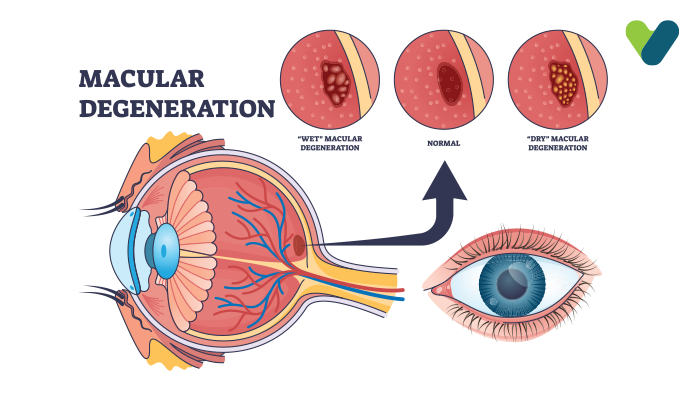Macular degeneration is an ailment related to the eye. Also known as age-related macular degeneration, the disease is very common and leads to gradual vision impairment. It is commonly found in people above the age of 50. The central part of the retina is known as the macula and with age, it starts to weaken or degenerate. This happens commonly and is one of the leading eye disorders in older people.
Macular Degeneration - The Causes
The main cause of macular degeneration is age. With age, the macula begins to lose its power and this leads to blurry vision. Since the macula is in the center of the retina, you find it hard to focus on finer details and see them. Larger things can still be visible, but the fine lines and objects become hard to spot. The macula helps you to see things in direct, straight sight. When it starts to degenerate, you cannot see the things right in front, but the ones on the sides are visible. For example, when looking at your watch, you may be able to read the numbers on the side of the watch but you would struggle to see the hands of the watch.Apart from age, some other factors also contribute to the illness and you get to see the macular degeneration symptoms sooner. Some of them are:
- Family history of the disease among your parents or grandparents
- A prolonged period of smoking
- Eating an unhealthy diet with lots of saturated fats
- Obesity
- Have diseases such as diabetes and/or hypertension
If you are prone to these conditions, you may have a higher chance of getting macular degeneration.
Macular Degeneration Symptoms
The common macular degeneration symptoms include:1. Impact On Vision
The biggest impact is on your vision, namely, the central vision. You find it hard to see things in a clear and precise manner and may need to squint your eyes to understand exactly what it is that you are looking at. Reading a fine print may also become a bit of a challenge when you have macular degeneration.2. Blurry Central Vision
As stated, the central vision gets impacted the most. In cases of acute macular degeneration, you find it difficult to see the things in your straight vision. However, you can still see it from the edge of your eyes.3. Change In Perception Of Colour
In rare cases, the perception of colour changes. For example, you find it difficult to distinguish between blue and green or red and orange.If you experience any of the above-mentioned symptoms, be sure to get an immediate eye-check up done. Also, if you have aged parents who may have similar complaints, take them to the eye doctor at the earliest as well.
Macular Degeneration Treatment
To date, there is no specific macular degeneration treatment. However, the condition can be managed and controlled with certain supplements and therapies. When diagnosed with macular degeneration, you are given one or a combination of the following:- Copper
- Zinc
- Vitamin C
- Vitamin E
- Lutein
- Zeaxanthin
Apart from medicines and supplements, the doctor will also advise you to eat a balanced diet that includes a lot of natural minerals and vitamins. For example, foods high in vitamin C such as citrus fruits must become a part of your daily diet.
Types Of Macular Degeneration
There are mainly two types of this disorder. They are:1. Dry Macular Degeneration
This is the more common type of macular degeneration where many yellow balls of a protein called drusen form on the macula. These are like deposits that happen on the surface of the macula. As these grow and multiply, it blocks your vision and may lead to complete loss of the central vision too.2. Wet Macular Degeneration
This is a very rare form of macular degeneration. Here, blood vessels begin to grow beneath your retina. The blood, along with some other fluids builds up and then leaks onto your macula, causing blurred or distorted vision. The bleeding leads to some permanent scars on your macula that impact the central vision and can also lead to tala loss of the central vision.You need to meet your doctor as soon as you show the symptoms of macular degeneration and get a confirmation of the type of disease that you may have. Only then can the correct management path be found.
3. Taking The Right Precautions
It is never too early to start testing for macular degeneration. Many people see the condition getting worse because they remain unaware. While regular visits to your eye doctor after the age of 40 are highly advisable, you can also practice some home tests from time to time to understand whether or not you tend to develop age-related macular degeneration.Get an Amsler Grid and paste it on your refrigerator, or any place where you can access it regularly. Focus on the dot in the middle and see how well you can see it and the lines around it. See it with both eyes. Then cover one eye and see it with the other and vice-versa. If at any point you feel the dot or the lines/grids get blurry or invisible, speak to your doctor at the earliest and start the macular degeneration treatment.


